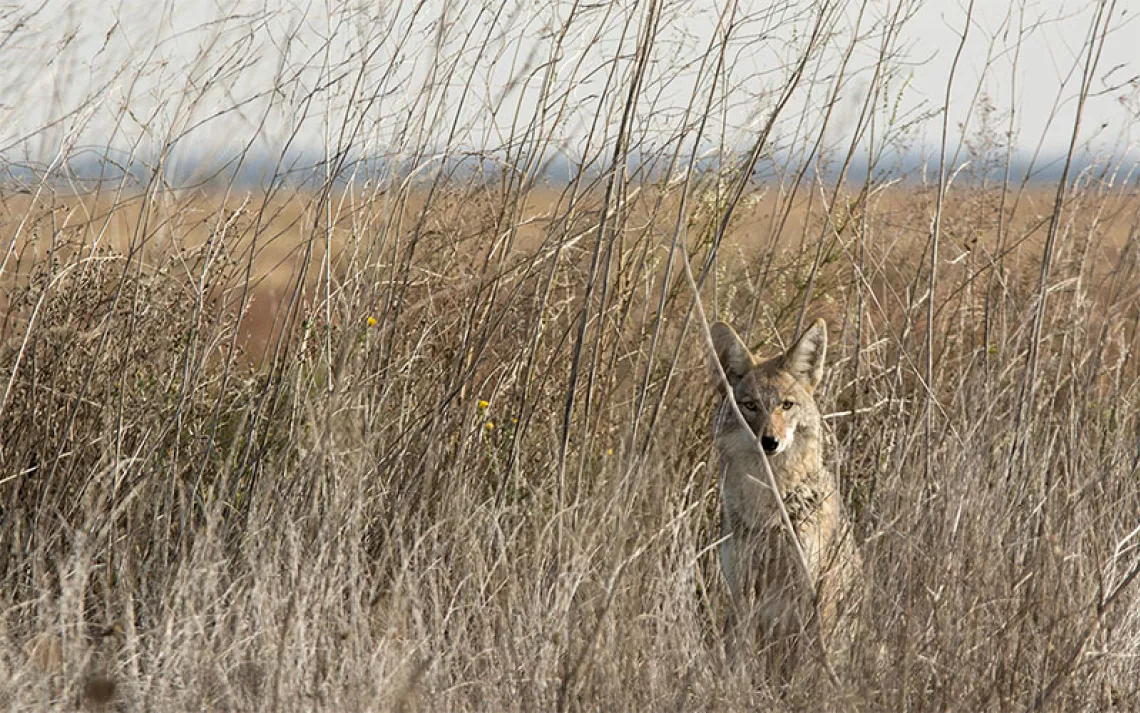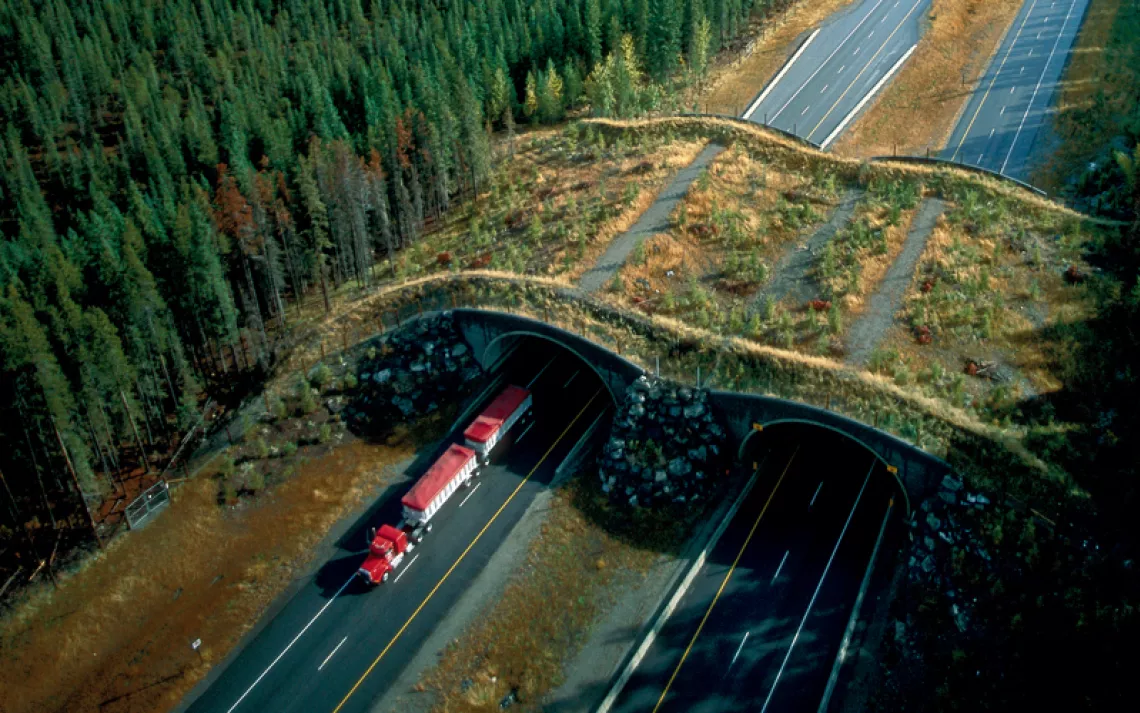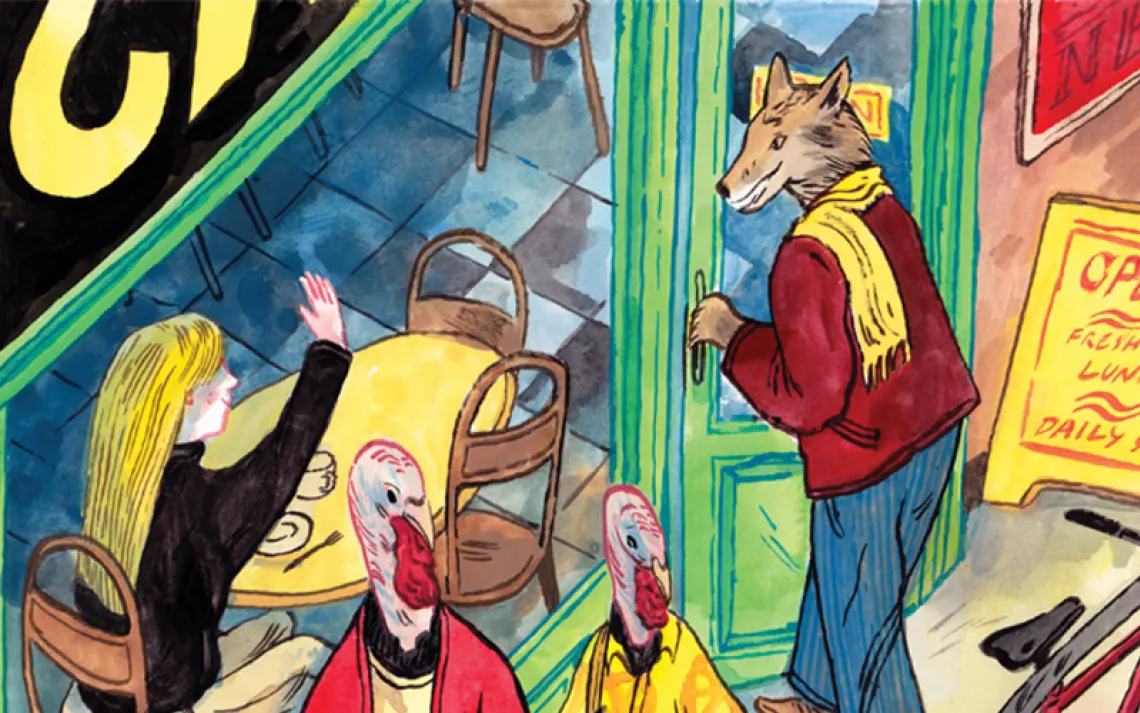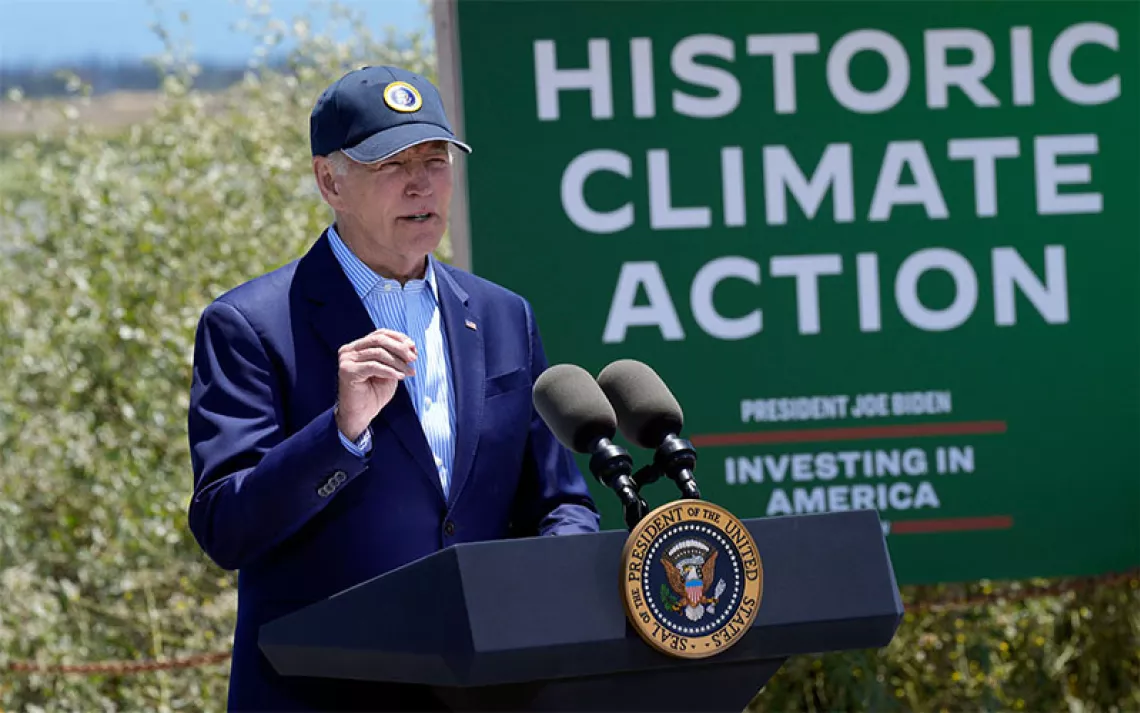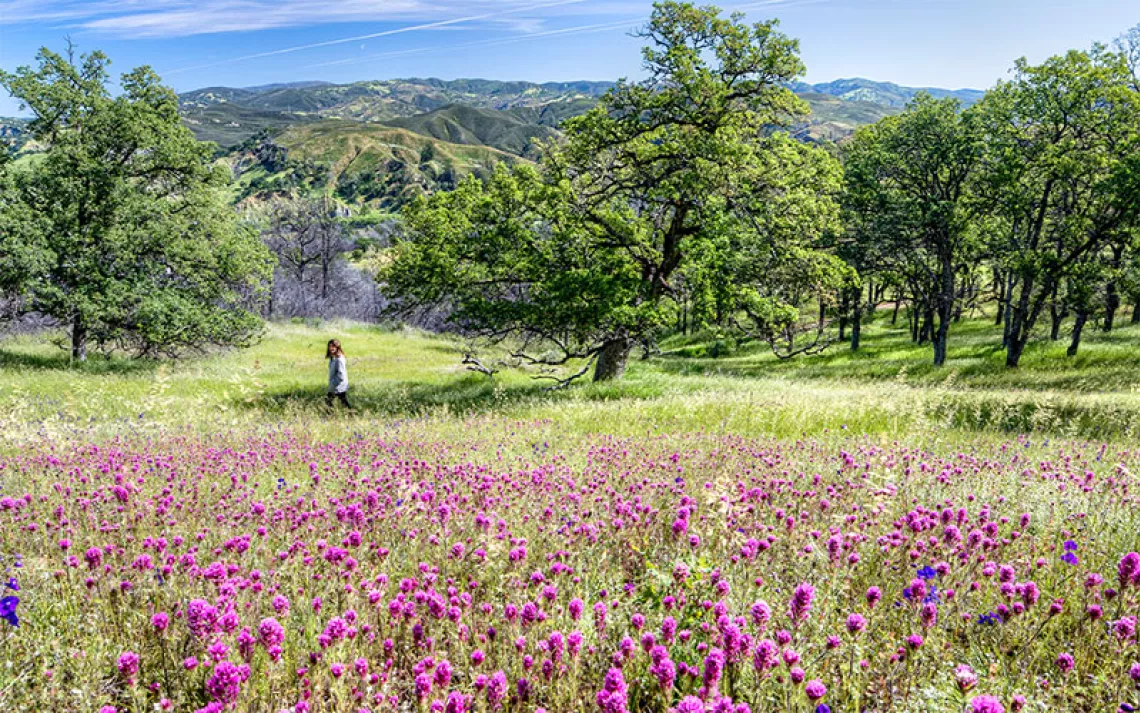Coyote Hound Hunts and Wolf Wars
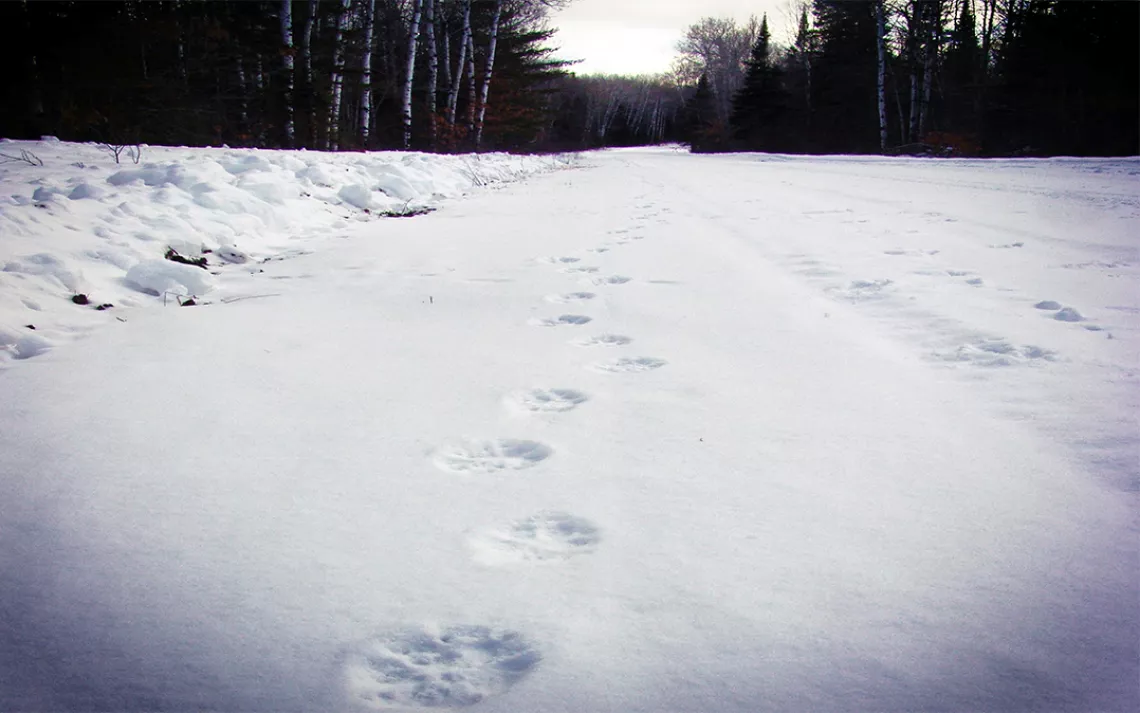
Photos courtesy of Elizabeth Claire Alberts
Rod Coronado hit the brakes, bringing his Toyota pickup to a halt on the snow-covered road. He opened his door—ignition beeping—and crunched his boots onto the snow. His travel companion, a 37-year-old Wisconsin woman named Keri Lewis, jumped out the back of the dual cab to follow. Together they studied the snow for what they’d spotted from the truck: large, wide paw prints with distinct claw marks: large inner toes and splayed outer toes. “Wolf tracks,” Coronado said, placing a measuring stick beside one of the prints. It was about four inches long and four inches wide. “But it looks like they were here hours ago.”
Coronado, Lewis, and I are in the Moquah Barrens, a 63-acre area of pine forests and open meadow in the Chequamegon-Nicolet National Forest in northern Wisconsin. It’s the end of winter; the air is crisp and layers of snow are packed hard on the ground. Impressions of deer hooves and rabbit feet pepper the roads, crisscrossed by wolf and coyote tracks. For many people—Coronado and Lewis included, who both spend countless hours in the national forest—tracks are the closest they’ll get to the elusive gray wolf (canis lupus). Before European colonization, gray wolves roamed the entire continental United States, but by 1960, the species had virtually been hunted to extinction, with only a small number remaining in upper Michigan and Minnesota. Then in 1973, the U.S. Congress enacted the Endangered Species Act (ESA), and gray wolves received special protection for the first time in history. A recovery process began, and the gray wolf population slowly rebounded.
In 2011, Wisconsin had a population of approximately 800 gray wolves. At the same time, the federal government managed to delist the gray wolf as an endangered species in Wisconsin, handing the management of the species over to the state. Between 2012 and 2014, the Wisconsin Department of Natural Resources (DNR) opened two seasons in which permit holders could hunt gray wolves. The state mandated a strict quota, but the Wisconsin wolf population plummeted to about 660 in 2014 anyway. The government reinstated the gray wolves’ endangered-species status, putting a halt to the state’s wolf hunts.
A recent report shows that current wolf populations in Wisconsin could now be anywhere between 866 and 897, but Coronado believes this number still doesn’t constitute a sustainable population. In response to these concerns, he started an organization called Wolf Patrol to monitor hunting and trapping activities on public lands, and report suspicious or illegal activities to the authorities. While patrolling the national forest in Argonne, Wisconsin, in 2016, Coronado and Lewis came across fish hooks baited with meat, dangling from tree branches. “They were intended to kill wolves and coyotes,” Coronado said. “Within one hour, a game warden was on the scene, taking those baits down and investigating and looking for the people responsible so they can be prosecuted to the fullest extent of the law. That was a victory.”
Wolf Patrol has garnered support from animal lovers and conservationists around the world—the organization’s Facebook page has nearly 10,000 followers, and Coronado’s GoFundMe crowdfunding page regularly earns large donations. A lot of support comes from the fact that Coronado is a rock star in the animal rights and environmental movements. His activist career started with Sea Shepherd Conservation Society when Coronado, a Pascua Yaqui Native American, was only 18. Two years after he joined the crew, Coronado did something for the record books: He and fellow activist David Howitt traveled to Iceland, a country that’s continued to hunt whales even after the International Whaling Commission declared a global moratorium on whaling in 1982. Under cover of darkness, Coronado and Howitt entered an Icelandic whaling station, destroyed equipment, and confiscated records. Then they boarded two empty whaling ships and removed the saltwater cooling valves in the engine rooms, which sank the two ships to the bottom of Reykjavik Harbor. They fled the country and claimed responsibility for their actions. Iceland declared what they had done illegal but refused to prosecute the men. The government was clearly hamstrung by the fact that it too had broken the law by continuing to hunt whales.
Coronado might have gotten off easy in Iceland, but he hasn’t always evaded the law. In the 1990s, he set fire to a Michigan State University animal fur research facility under the banner of the Animal Liberation Front. His attack caused $125,000 worth of damage and obliterated 32 years of research data. He was charged with a felony and sent to federal prison for five years. He’s also served stints in federal prison for conspiring to interfere with a mountain lion hunt in Arizona, for explaining how he set fire to the Michigan State University facility in a public lecture, and for even accepting a Facebook friend request from a fellow activist, which broke the conditions of his probation.
Coronado might gain supporters with his notorious reputation, but Wolf Patrol isn’t without its critics—mainly, the hunters themselves. After a number of hunters complained about Wolf Patrol “harassing them out in the field,” Wisconsin state representative Adam Jarchow introduced the Right to Hunt Act, a bill that would make it illegal to follow, photograph, or record hunters, even when they are just scouting the field or training their hunting dogs. This legislation is similar to the ag-gag laws in other U.S. states, but instead of silencing whistle-blowers revealing animal abuse on farms, the Right to Hunt Act aims to put a muzzle on wildlife activists. On April 2, 2016, Governor Scott Walker signed the bill at the Wisconsin Bear Hunters’ Association’s 52nd annual convention in Rothschild, Wisconsin, saying in a statement that the bill provides hunters with “additional protections from interference.”
Coronado opposes the law, arguing that it violates constitutional rights. “The public always has a right to know what’s happening on public lands,” Coronado said. “The fact that Governor Walker decided to sign the bill into law at the annual convention in Wisconsin Bear Hunters’ Association—I think he’s making it very clear that he’s answering to the special interest of one small group.” Even with the law in place, Coronado and Wolf Patrol members have continued to monitor hunting activity in Wisconsin. In an email he sent prior to my trip there, Coronado wrote, “It they [the law officials] think our monitoring efforts are illegal…then we are prepared to get arrested.” However, the hunter harassment law has not been enforced to date, and a recent video on Wolf Patrol’s YouTube site shows a positive interaction between its members and U.S. Forest Service law enforcement officers: The officers have a friendly chat with Coronado and his crew, and tell them to “keep up the good work.”
*
It was February 2016 when I went out into the field with Coronado and Lewis, two months before the Right to Hunt Act officially came into effect. Coronado was conducting a survey for the DNR’s volunteer carnivore tracking program. He’d been allocated a 30-mile radius west of Ashland, Wisconsin. His plan was to drive around the area and collect data about wolf tracks or sightings, which he’d compile into a report for the DNR. Of course, he was on the lookout for any kind of activity that could negatively affect wolves, such as illegal baits or traps. That said, on this particular trip, he was looking for one main activity: coyote hound hunting.
Hound hunting—whether it’s to hunt coyotes, bears, foxes, or other mammals—has a long tradition in U.S. history. You could safely say that hound hunting is as old as the American colonies themselves. In Wisconsin, you don’t need a license to hunt with dogs, so it’s difficult to estimate how many hunters use dogs to hunt. However, the Wisconsin Bear Hunters’ Association has nearly 3,000 members, and according to Lewis, most of the members would probably own 5 to 10 dogs. Bear-hunting season is between September and October, but there is no allocated season to hunt coyotes—instead, Wisconsin hunters can use dogs to hunt coyotes any time of the year. Other states, such as Michigan and West Virginia, have open coyote-hunting seasons, making coyotes one of the most persecuted animals in the world. Despite these extermination attempts, the animal has defied the odds and continued to thrive. But according to Coronado, coyote hunting is bad news for wolves.
“The biggest threat that coyote hunting has toward wolves is that a lot of it takes place in areas where gray wolves habitate [sic],” Coronado explained. “So what you have is a federally protected endangered species where hunters are going into these areas and offering prizes for the largest coyote kill. So that’s just setting up a perfect storm where they have somebody thinking that they’re going to win a coyote contest, and they shoot this wolf, which they think might be a large coyote.”
Besides a possible case of mistaken identity (or perhaps, intentional “error”), setting hounds loose around wolves spells disaster for the dogs themselves, Coronado believes. So far in 2016, wolves have killed over 20 hunting dogs. The Wisconsin government offers compensation of $2,500 per lost hunting dog, but Coronado believes that whenever a wolf kills a dog, the community increases its resentment toward wolves, which may result in retribution killings.
Coronado also suggests that hunting coyotes is cruel. “I’ve heard stories of coyotes that have been run down for 17 miles by packs of hounds,” he said. “We’ve heard stories of animals being caught in snares and chewing off their own feet to get out of foothold traps…. This is a very real violence taking place on public lands every day in Wisconsin.” But he maintains that Wolf Patrol is not an animal-rights group, nor is it an anti-hunting group. Instead, he espouses the idea of supporting ethical hunting practices. “We want those ethical sportsmen to come forward and let us know when they see something illegal, and know that we’re not just going to attack them as well. We’re going to go after people who are breaking the law, and where we believe a hunting practice is unethical or unsporting, we’re going to try and draw attention to that and hope the public takes action to make it illegal.”
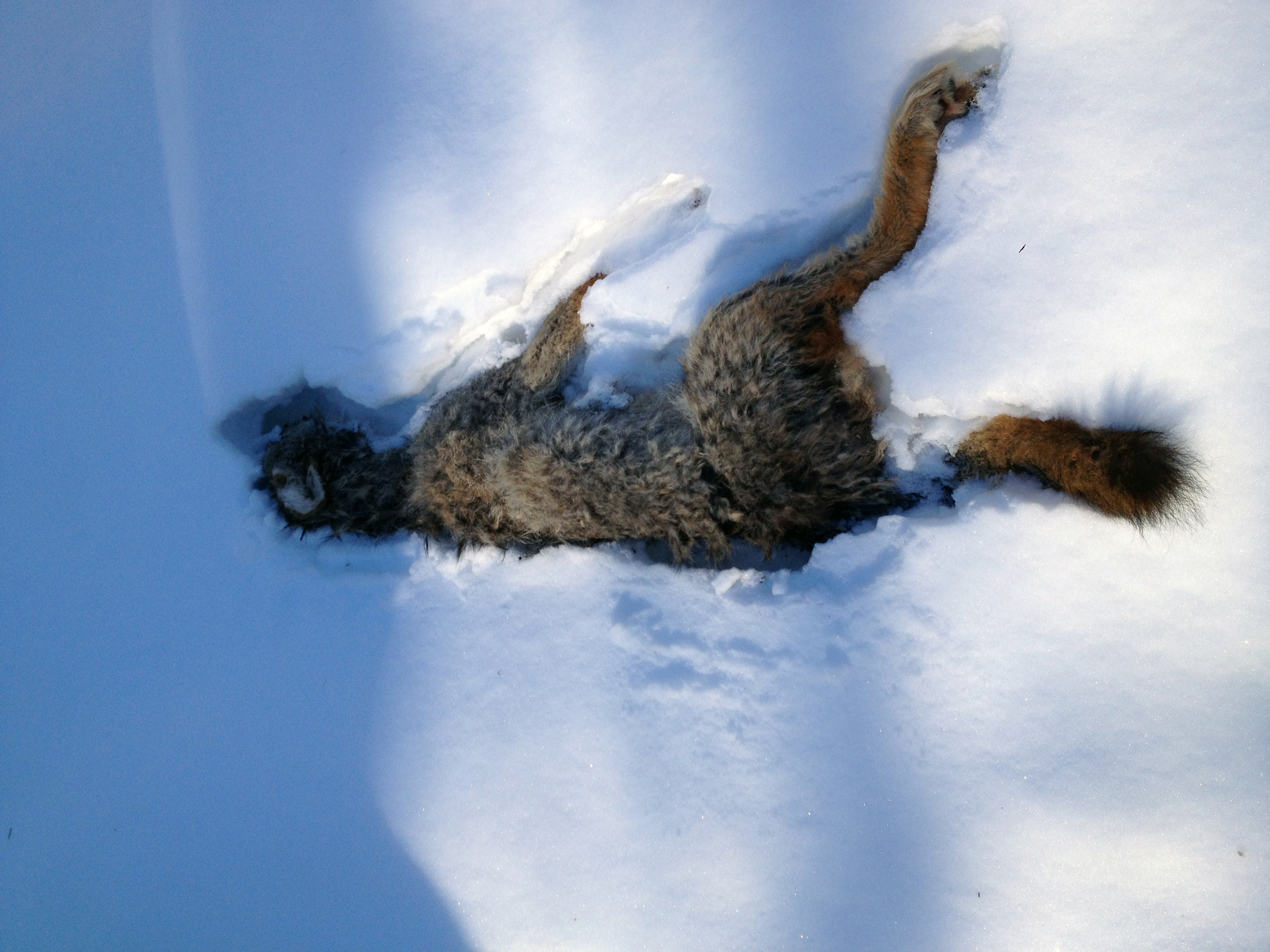
*
After Coronado and I met Lewis at a roadside motel, we piled into Coronado’s pickup truck and ventured into the Chequamegon-Nicolet National Forest. As we drove along the snowy roads, he surfed the channels of his CB radio, trying to pick up any hunting chatter, but we only heard the voices of truck drivers travelling down the local highway. Surprisingly, we didn’t come across anyone—or anything—suspicious, although we found plenty of wolf tracks, which Coronado documented for his DNR survey.
At the end of the day, we pulled onto the main road and headed back to Ashland. When we drove past a local dive bar in the small town of Ino, Coronado and Lewis spotted two trucks with hound-hunting boxes hitched to the trailers. Lewis leaned forward in her seat, suggesting we go inside and talk to the hunters. But Coronado wasn’t sure. He wasn’t well liked in the area and suspected he’d be lambasted if he went inside. He suggested that Lewis and I go in by ourselves and see if we could get any information about hunting activity in the region, or better yet, document any illegal activity in the field.
With lapel microphones tucked under our winter clothes, Lewis and I headed in the bar, passing a fur pole, where hunters usually string up their “cai-oat” kills next to the parking lot. Lewis and I managed to sit next to the hunters—two 50-something brothers, Ross and Todd Darst—and we chatted with them over pints of Leinenkugel Honey Weiss. The Darst brothers hailed from Hixton, Wisconsin, but they spent the winter months hunting in Ashland, which they’d been doing for over 30 years. While neither Lewis nor I revealed our true identities at the time, the brothers vociferated their dislike for Wolf Patrol whenever we mentioned wolf protection efforts in the area. In fact, they both suggested that Coronado was a “bum” who preyed on people’s sympathies to collect money on his GoFundMe site. When Lewis and I asked them to take us hound hunting the next day, to our amazement, they agreed.
At 8 A.M. the next morning, Ross and Todd picked us up in their two hound-hunting trucks in front of the bar. Hounds whimpered in their boxes as the truck engines warmed in the crisp morning air. On the window of Todd’s Chevy pickup was a sticker of a wolf in a crosshair bordered by the words “Hunt Hard, Shoot Straight, Kill Clean, Apologize to No One.” When I asked Ross about the sticker, he laughed and said it was already on the truck when he’d bought it. He also explained that neither of them had ever killed a wolf, although Todd had gotten a permit during the 2013–14 season. “But he never killed one,” Ross said. “The quota had already been met before he went out.”
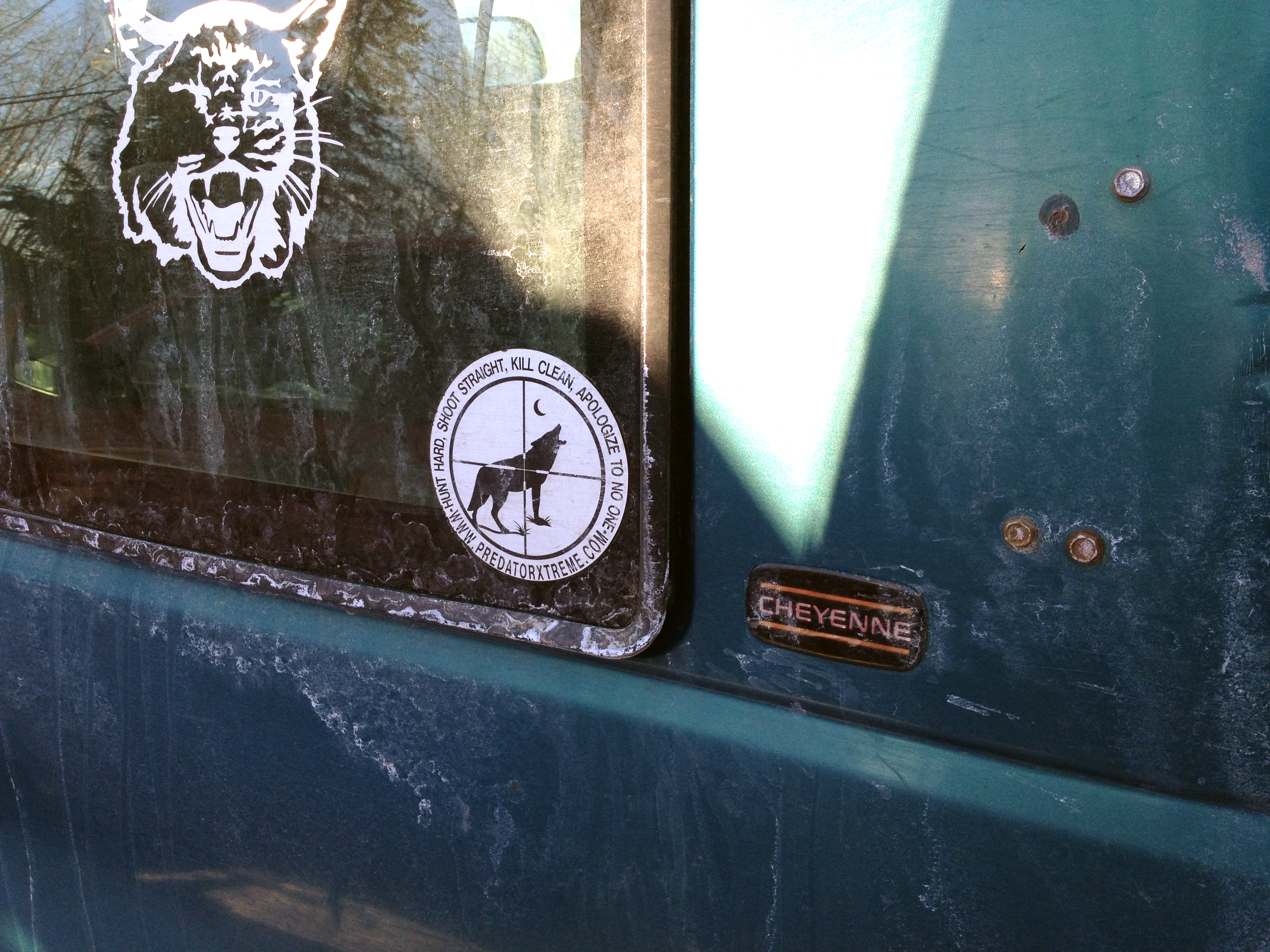
Lewis got in the car with Ross, while I decided to ride with Todd. After we stopped for a quick coffee at the gas station, we made our way into the national forest to go coyote hunting. We drove a different way than we had with Coronado the previous day, but I was surprised how similar the hunters’ activities were to Wolf Patrol’s: Like the activists who worked to protect wolves, the hunters inched their vehicles along the snow-covered roads, gazing out the window to look for tracks. When they spotted wolf tracks, Ross and Todd sometimes hopped out to get a closer look, but they always drove away from the areas with wolf activity. Not only did they not want to endanger their dogs’ lives, the hunters also didn’t seem interested in bothering the wolves. When they eventually found fresh coyote tracks, they let out two hounds, rather than the allocated six dogs you’re allowed to set loose on each animal.
As the hounds chased the scent, Todd handed me a GPS tracker that showed where the dogs were running. At first, the dogs stayed together, but after about 20 minutes, they split up. When the hounds strayed more than a mile away from the trucks, Ross and Todd started their engines and drove after them. But for the most part, we just waited—listening for the hounds, watching the GPS tracker, and trying to guess the dogs’ next move. I asked Ross why he hunted coyotes, especially as it didn’t seem as action-packed as I had imagined. “To enjoy the outdoors and for food,” he said, “and so the dogs have a rewarding life. Hound hunting is more for the dogs—to take them out, and seeing them running and being happy.” While Ross appeared to care about the well-being of his hounds, it seemed peculiar that he didn’t feel sympathetic toward wolves, especially as they’re close cousins to dogs. “Wolves should be hunted,” he said. “Their numbers should be controlled. When they first started coming around, I thought it was pretty neat, but with everything that’s been going on with the depredations, I don’t think much of them now, because they’re hurting the dogs.”
While the Darst brothers might not think much of gray wolves, they never did anything—illegal or otherwise—to endanger the species while hunting that day. In fact, they didn’t even end up killing a coyote. After several hours, they rounded up the hounds and drove them back to their Ashland property. When I later questioned Ross if he’d ever report anyone doing something illegal, he said, “Most likely. There was a guy once who killed a buck and sawed off the antlers but let the animal go to waste. I’d love to find that person and turn them in.” But when I asked if he’d ever work with Coronado or Wolf Patrol to monitor and report illegal hunting activities, Ross said, “No, because Coronado and Wolf Patrol irritate people to the point where they lose their temper. Then they catch it on film to portray these people in a negative way, as if this is how they normally are.”
The Darst brothers and Coronado obviously see things differently, but it seems a shame that there isn’t more cooperation between both sides, especially as Coronado himself said that he’d like to work more closely with “ethical sportsmen.” The Darst brothers, from my and Lewis’s observations, seemed to hunt according to the ethical standards Coronado supports.
In an interesting turn of events, Lewis started a romantic relationship with Ross after our hunting expedition, and this led Coronado to remove Lewis from the Wolf Patrol team. In a discussion I later had with Lewis, she said, “I think Wolf Patrol lost a great opportunity when they kicked me out. Having a line of communication directly with hunters can only be a good thing. Ross, and other hunters he knows, realize my past with Wolf Patrol, and I’ve only been welcomed by them. Talking about wolves with the opposition is the only way to really make progress.”
Wolves currently remain on the endangered-species list, but Coronado believes it’s just a matter of time before they’re delisted and hunted again in Wisconsin. “We can’t live a pipe-dream vision to think that wolves will forever be protected,” said Coronado. “We have to be prepared for when they’re hunted again, as they most certainly will in Wisconsin.”
Governor Scott Walker, who signed the Right to Hunt Act, recently voiced his desire for the resumption of the state’s annual wolf hunt. "We had a successful harvest set up with a wolf hunt. That’s why we further modified it,” Walker told Wisconsin Public Radio. “So, we’ve showed we can do a good job of monitoring our harvest. We just need the federal judge to give us that opportunity again."
If—or perhaps, when—wolves are hunted again in Wisconsin, Wolf Patrol and hunters are likely to have more interactions on and off the field. While both groups may continue to disagree, it would be remarkable if Wolf Patrol and hunters, as well as state representatives, found a way to work together to create a more sustainable future for wildlife.
 The Magazine of The Sierra Club
The Magazine of The Sierra Club
